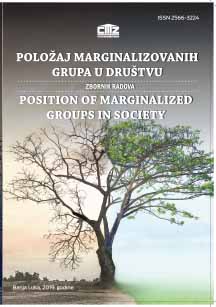IMPLIKACIJE JAČANJA DESNIČARSKOG EKSTREMIZMA NA SIGURNOST U DRUŠTVU
INCREASING IMPACT OF RIGHTWORTH EXTREMISM TO SECURITY IN SOCIETY
Author(s): Safet MušićSubject(s): Politics / Political Sciences, Social Sciences, Law, Constitution, Jurisprudence, Criminal Law, Civil Law, Sociology, Government/Political systems, Security and defense, Social Norms / Social Control, Sociology of Law
Published by: CENTAR MODERNIH ZNANJA
Keywords: Right-wing extremism; security; violent extremism; democracy;
Summary/Abstract: The term right-wing extremism is often used to describe Nazism, fascism and other ideologies or organizations that have ultranationalist, chauvinistic, xenophobic, racist and anti-communist views. In recent years, there has been an increase in the popularity of right-wing ideologies in Europe, for many it is the highest percentage of popularity since World War II. Observed through historical phases, extreme right-wing parties were marginalized in the post-World War II period, and their ideologies discredited due to a fresh recollection of the existence and defeat of Nazism. From the mid-'50s to the '70s, the most right-wing parties attracted charismatic leaders whose deep distrust of the political establishment led to the emergence of the so- nationality. In the early 1980s, the election successes of right-wing political candidates enabled extreme right-wing political parties to revitalize anti-immigration as the main issue. The causes of the strengthening of right-wing political options in Europe can be identified first in times of major economic crises and the lack of social cohesion. In doing so, the leaders of the right-wing parties use social disorders such as migration, violent extremism that leads to terrorism, etc., for the production of fear, the spread of intolerance and the mobilization of nationalist forces.As already tested in case of the ideology of Nazism, advocating for one's own nation as superior and proclaiming other, usually minority nations for enemies, today's right-wingers in some European countries use the same matrix. In Germany in the 1930s, the Jews and the Roma, and nowadays persecution is called by migrants or Muslims, the target will be another tomorrow, because in order to get votes and achieve national unity, the enemy must also be found. What is troubled by the democratic public in countries where right-wing parties increase in the number of parliamentary mandates, this trend can lead to oppression and violence against groups of people based on their belonging to minority peoples, ethnic groups, or simply different liberal perceptions and views on society. Right-wing ideologists use the migrant crisis to revive the dangerous ideology of Nazism, closing up borders with wires across the Europe for migrants, while also surpressing some civil society organizations, undermine the foundations of an independent judiciary, diminish media freedom. All this has already been seen in Nazi Germany after coming to power in the Nazi Party in 1930. In some European countries, paramilitary groups are formed, and such groups that have carried out exercise activities have been discovered in the forests of Germany, Slovakia, the Czech Republic, Bulgaria and even Slovenia. For historical reasons, and because of the current global developments in the world, it is evident that in fact, right-wing extremism is a security threat, and it is necessary to clearly point out the potential danger.It is not so problematic the right-wing parties that hide from the Nazi doctrine and methods of action, those who do not call for violence in their program, however, these others pose a threat to security and, consequently, a liberal democracy that promotes the ideology of multiculturalism.In Southeast Europe, and especially in Bosnia and Herzegovina, democracy is fragile and needs to respond to all violence and hatred, and preserve the foundations of the European Union - tolerance, freedom of speech, if it does not call for violence, and other fundamental human rights.
Journal: DRUŠTVENE DEVIJACIJE
- Issue Year: IV/2019
- Issue No: 4
- Page Range: 583-593
- Page Count: 11
- Language: Bosnian

